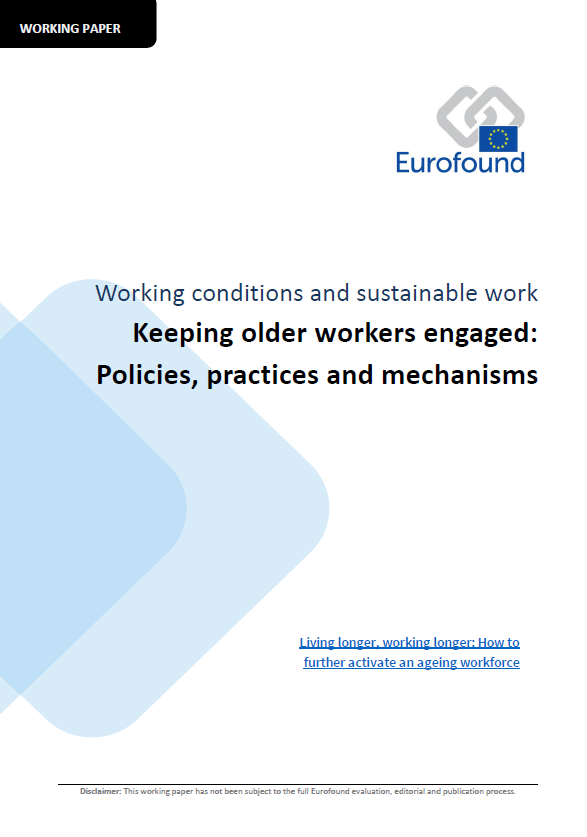EU context
Nepaisant gerokai padidėjusio vyresnio amžiaus darbuotojų užimtumo lygio per pastarąjį dešimtmetį daugumoje ES šalių, Europos Komisijos bendroje 2017 m. užimtumo ataskaitoje atkreipiamas dėmesys į tai, kad šis užimtumo lygis gali dar labiau padidėti. 2016 m. 55–64 metų vyresnio amžiaus darbuotojų užimtumo lygis ES buvo 55,3 proc., palyginti su apskritai 66,6 proc. 15–64 metų darbuotojų užimtumo lygiu. Labiausiai šis rodiklis padidėjo tarp vyresnio amžiaus moterų.
Europos socialinių teisių ramstyje numatyta sistema, kuri padeda darbo rinkoms prisitaikyti prie naujų iššūkių, taip pat skatina sąžiningumą ir kartų solidarumą. Šiame ramstyje pabrėžiama teisė į darbo aplinką, kuri yra pritaikyta prie darbuotojo profesinių poreikių, kad darbuotojai galėtų ilgiau išlikti darbo rinkoje. Be to, naujausiame nepriklausomame Europos socialinių partnerių susitarime dėl vyresnių žmonių aktyvumo ir kartų solidarumo požiūrio įsipareigojama palengvinti vyresnio amžiaus darbuotojų galimybes aktyviai dalyvauti ir ilgiau išlikti darbo rinkoje.
EUROFOUND atliktas darbas
EUROFOUND turi ilgalaikę patirtį sprendžiant su senėjančia darbo jėga susijusius klausimus. Nuo 1990 m. tyrimuose daugiausia dėmesio skiriama vyresnio amžiaus darbuotojų dalyvavimui darbo rinkoje, darbo sąlygoms ir darbo prioritetams, atsižvelgiant į kintančią Europos demografinę padėtį. Vykdomas darbas taip pat buvo orientuotas į viešąją paramą ir įmonių lygmens iniciatyvas, kuriomis skatinamas vyresnio amžiaus darbuotojų užimtumas. EUROFOUND nagrinėjo vyresnio amžiaus moterų darbuotojų padėtį, atkreipė dėmesį į šios grupės didėjantį užimtumo lygį ir didėjančią jų dalį tarp visų darbuotojų, ypač, 55–64 metų amžiaus grupėje.
Tyrimo duomenys
Pagrindiniuose EUROFOUND tyrimuose pateikiami įvairūs duomenys apie vyresnio amžiaus darbuotojų padėtį. Šeštajame Europos darbo sąlygų tyrime (EDST) nagrinėjama, kokią padėtį užima vyresnio amžiaus darbuotojai atsižvelgiant į įvairius darbo kokybės aspektus. Nors tikimybė, kad vyresnio amžiaus darbuotojai taps bedarbiais, yra mažesnė, palyginti su jaunesniais darbuotojais, iš duomenų matyti, kad vyresnio amžiaus darbuotojai mano, jog, netekę darbo, jie neras naujo panašaus apmokamo darbo, ir net būtų linkę manyti, kad jiems būtų sudėtinga iš naujo patekti į darbo rinką.
Penktuoju EUROFOUND Europos darbo sąlygų tyrimu (EDST) pagrįstame tyrime nagrinėjamos vyresnio amžiaus darbo jėgos ir darbo skirtingais amžiaus tarpsniais ypatybės, taip pat veiksniai, dėl kurių darbas tampa tvarus senėjančiai darbo jėgai: geros darbo sąlygos, fizinė ir psichinė gerovė ir profesinio ir asmeninio gyvenimo pusiausvyra.
EUROFOUND Europos gyvenimo kokybės tyrime (EGKT) pateikiamos su amžiumi susijusios išvados dėl įvairių gyvenimo Europoje kokybės aspektų. Darbo prioritetų, kai asmenys sulaukia 50 metų, analizė yra pagrįsta trečiuoju EGKT ir iš jos matyti, kad dauguma vyresnio amžiaus darbuotojų pirmenybę teikia trumpesniam darbo laikui, net ir įvertinę savo finansinius poreikius. Palengvinus šį glaudesnį darbo valandų ir prioritetų suderinimą, galima sudaryti sąlygas darbuotojams dirbti ilgiau neprarandant motyvacijos.
Ilgesnis profesinis gyvenimas
Neseniai EUROFOUND prisijungė prie kitų trijų ES agentūrų, kad išnagrinėtų amžiaus požiūriu palankų darbą Europoje, su senėjančia darbo jėga susijusius politinius iššūkius ir naujoviškus sprendimo būdus.
Dauguma darbuotojų negali arba neturi motyvacijos dirbti iki pensinio amžiaus. Vis dėlto yra grupė darbuotojų, kurie gali ir nori dirbti sulaukę pensinio amžiaus. EUROFOUND ištyrė šį plintantį darbo išėjus į pensiją reiškinį.
Neseniai atliktame tyrime daugiausia dėmesio skiriama profesinio gyvenimo ilginimui nustatant lanksčias išėjimo į pensiją schemas, visų pirma nagrinėjamos dalinio išėjimo į pensiją schemos, kurios gali palengvinti profesinio gyvenimo pailginimą. Karjeros vidurio peržiūros taip pat gali prisidėti prie ilgesnio profesinio gyvenimo. Tyrime buvo nagrinėjama, kaip vidurio karjeros peržiūros gali padėti išsiaiškinti darbuotojų galimybes, susijusias su išlikimu darbo rinkoje iki vėlesnio išėjimo į pensiją amžiaus. Jame atkreipiamas dėmesys į įmonių sukurtas priemones, kuriomis siekiama išlaikyti senėjančius darbuotojus.
Kitame tyrime pateikiamos nacionalinės ir sektorių iniciatyvos, kurias įgyvendina vyriausybės ir socialiniai partneriai, kad išlaikytų vyresnio amžiaus darbuotojus darbo rinkoje, įskaitant finansines paskatas ir pagerintas sąlygas. Ankstesniame projekte, siekiant atkreipti dėmesį į gerąją patirtį, buvo nagrinėjamos Europos įmonių iki ir po ekonomikos nuosmukio įgyvendintos amžiaus valdymo iniciatyvos.
Ištekliai
















